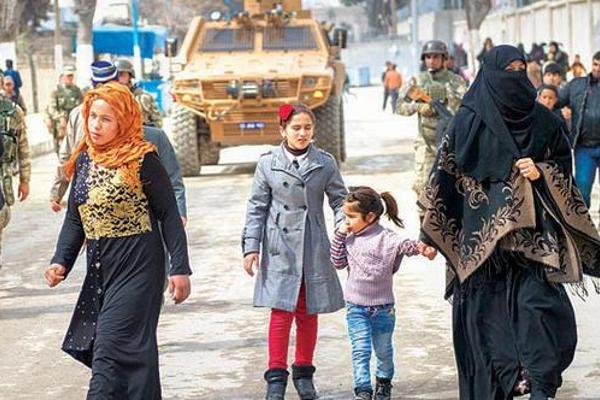Jerablus to revive as thousands of Syrians return to city from Turkey
Zeynep Bilgehan – GAZİANTEP


The northern Syrian city of Jerablus, on the border with Turkey, is rising from ashes after Turkey-led operations in 2016 ousted Islamic State of Iraq and the Levant (ISIL) militants from the city.
The population of Jerablus has recently increased to 200,000, a surge from 2,000 over 16 months during ISIL’s siege. Some 58,000 of the 200,000 are Syrians who returned from Turkey.
In September 2016, Turkey launched an operation to liberate the city from ISIL. Since then, it has been reviving and many have gradually returned to the city.
To mark International Women’s Day, the Ankara Chamber of Industry on March 7 visited the city and the Humanitarian Assistance Coordination Center in Jerablus, where Turkey aims to provide humanitarian assistance for the city’s residents and contribute to infrastructure works.
Yaşar Aksanyar, the deputy governor of the Turkish border province of Gaziantep and the head of the Humanitarian Assistance Coordination Center in Jerablus, told daily Hürriyet about the activities and efforts of the center to turn life back to normal in the city.
“Currently, some 900 new construction works are going on in Jerablus. We opened a local council in September 2017 and a police department started to operate in the city,” Aksanyar said.
“We have 600 local police officers, 200 commandos, 3,000 soldiers and 350 civilian consultants there. Nearly 3,000 babies are born in the new hospital, which has a capacity of 1000 people,” he added.
With Operation Euphrates Shield in 2016, Turkey took the border city of Jerablus on the west of the Euphrates River and cleared a roughly 100-kilometer area along the border of ISIL militants.
Turkey currently hosts almost 4.3 million refugees, according to a two-year study conducted by the Turkish Parliament’s Refugee Subcommittee that operates under the Human Rights Committee.
Of the millions taking refuge in Turkey, 3.4 million people reside in the country under Turkey’s temporary protection. The remaining 600,000 refugees have residence permits, the report showed.
